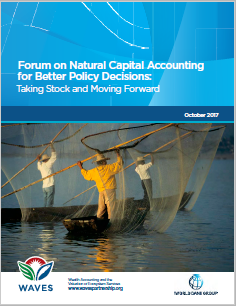Nov 22, 2017 to Nov 23, 2017
2nd Forum on Natural Capital Accounting for Better Policy

The 2nd Forum on Natural Capital Accounting for Better Policy (NCA Policy Forum) will build on the 1st NCA Policy Forum and the experiences since then, which have been compiled in a comprehensive stock-taking publication: Forum on Natural Capital Accounting for Better Policy Decisions: Taking Stock and Moving Forward.
While the 1st NCA Policy Forum was about what NCA can do for better decisions, drawing on shared experience (Read more about it here), the 2nd will be about what NCA could and should do for better decisions, drawing on participants to generate new understanding and co-create focused guidance. More details can be found in this Background Document.
Contributions to the 2nd Policy Forum:
- SDG 13, the SEEA and New Zealand's missing carbon tax (Jeremy Webb)
- Green+: Monitoring the preconditions for sustainable development (Jeremy Webb)
- Ecosystem accounting to inform decisions about forest management in the Central Highlands, Australia (Heather Keith, Michael Vardon, David Lindenmayer)
- Research-practice co-creation as a strategy to foster use of natural capital accounting at the national level: practical replections from the Pacific (Pierre Bertrand, Gilles Dubochet, Francesco Obino)
- Natural Capital Accounting for State of the Environment Reporting in the Australian Capital Territory: A Proof of Concept (David Summers, Becky Smith, Kate Auty, Michael Vardon)
- Natural Capital Accounting for the Sustainable Development Goals: Current and potential uses and steps forward (Arjan Ruijs, Martijn van der Heide, Jolanda van den Berg)
- The role of natural capital accounting for biodiversity conservation – revisited (Steven King, Mark Eigenraam, Carl Obst, Michael Vardon, Daniel Juhn)
- Ecosystem Accounting in Water and Biodiversity Policies: Experience from a Pilot Project in Peru (Rosimeiry Portela, Mahbubul Alam, Claudio Schneider, Daniel Juhn)
AGENDA (available here and below)
Day 1: Wednesday 22 November |
|||
|
8.30 am |
Registration |
Tea and coffee |
|
|
9.00 am - 10.30 am |
Session 1. Welcome and openingSessions leads: Steve Bass and Sofia Ahlroth; Facilitator: Steve Bass |
||
|
|
This session will cover introductions, aims and “house rules” of the Forum. There will be a formal welcome, a recap of last year’s forum, and an introduction to this year’s. This will be followed by a ‘newsy’ country panel discussion highlighting progress in relation to the principles and recommendations coming out of the first forum. An “ice-breaker” will be followed by tea. |
||
|
9.00 am |
Welcome from MFA On behalf of the Forum collaborators: MFA, WAVES and UNSD/DESA |
|
|
|
9.20 am |
Recap from last year and aims of this year’s forum Objectives, outcomes, house rules |
|
|
|
9.30 am |
WAVES Building NCA into World Bank processes – An expansion of the WAVES program |
|
|
|
9.40 am |
UNCEEA
|
|
|
|
9.50 am |
News panel Countries reflect on:
|
|
|
|
10.20 am |
Welcome “Icebreaker” Getting to know our evolving community and its aspirations |
|
|
|
10.30 am |
Morning tea |
|
|
|
11.00 am - 12.30 pm |
Session 2. NCA and the SDGs - OverviewSession leads: Arjan Ruijs and Bram Edens; Facilitator: Salvador Sanchez-Colon |
||
|
|
This session will provide an overview of the SDGs and how NCA can help decision makers examine synergies and trade-offs within the SDGs, the institutional arrangements needed to achieve the SDGs, as well as monitoring the SDGs with NCA. It will be a combination of presentations, an expert panel, and table discussions. |
||
|
11.00 am |
Monitoring SDGs with NC |
|
|
|
11.15 am |
Decision-making with NCA for synergies and trade-off |
|
|
|
11.30 am |
Panel discussion |
|
|
|
12 noon |
Table discussions and report back |
|
|
|
12.30 pm |
Lunch |
|
|
|
1.30 pm - 3.00 pm |
Session 3. NCA and the SDGs Goals – The role of businessSession leads: Hannah Pitts, Omer van Renterghem and Elizabeth White; Facilitator: Hannah Pitts |
||
|
1.30 pm |
Introduction and welcome
|
|
|
|
1.45 pm |
Case studies from business
|
|
|
|
2.15 pm |
Reflections on the case studies in light of the SDGs |
|
|
|
2.25 pm |
Roundtable discussion
|
|
|
|
2.55 pm |
Summary and close |
|
|
|
3.00 pm |
Afternoon tea |
|
|
|
3.30 pm - 5.00 pm |
Session 4. NCA for SDGs – Exploring poverty reduction and green growthSession lead and facilitator: Steve Bass |
||
|
|
This session will be a workshop where the audience splits up into two groups to explore how NCA can be applied to deal with poverty or with green growth. Poverty reduction is SDG 1, while green growth cuts across several SDGs including SDG 8 - Decent work and economic growth; and SDG 12 - Responsible consumption and production. |
||
|
3.30 pm |
Session outline and questions for groups
|
|
|
|
3.40 pm |
Briefing 1: 5-minute introductory orientation on current green growth approaches from UNEP Briefing 2: 5-minute orientation on poverty reduction from World Bank Briefing 3: 5-minute real-world policy decisions for Zambia relating to green growth and poverty |
|
|
|
3.55 pm |
Breakout groups
|
|
|
|
4.50 pm |
Room discussion based on the report back |
|
|
|
5.00 |
Summary of the day |
|
|
|
5.15pm to 7.00 pm |
Cocktail function |
|
|
Day 2: Thursday 23 November 2017 |
|||
|
8.30 am |
Arrival |
Tea and coffee |
|
|
9.00 am - 10.30 am |
Session 5. NCA for SDG15 - Life on landSession leads: Bram Edens and Rocky Harris; facilitator: Salvador Sanchez-Colon |
||
|
|
This session will examine how NCA can be applied to the management of terrestrial ecosystems, including the sustainable use of forests, biodiversity loss, and land degradation. |
||
|
9.00 am |
Introduction to the session
|
|
|
|
9.10 am |
Country experiences (10 mins each)
|
|
|
|
10.00 am |
Table discussion
|
Theme-based discussions (e.g. biodiversity, forestry) |
|
|
10.30 am |
Morning tea |
|
|
|
11:00 am-12.30 pm |
Session 6. NCA for government processesSession leads: Arjan Ruijs, Sofia Ahlroth, and Michael Vardon; Facilitator: Michael Vardon |
||
|
|
This session will look at how NCA can be applied to government processes and policy tools (such as budgeting and taxation), and how NCA can be used in models to assess the impact of particular policy options. (presentation) |
||
|
11.00 am |
Botswana – Importance of water and NCA for sustainable development
|
|
|
|
11.15 am |
Indonesia – National Development Planning and NCA
|
|
|
|
11.30 am |
Rwanda – NCA as input to the mid-term National Strategy, 2018 to 2023
|
|
|
|
11.45 am |
Australia – Developing strategy and action plan for environmental economic accounting
|
|
|
|
12 noon |
Table discussions and report back |
|
|
|
12.30 pm |
Lunch |
|
|
|
1.30 pm - 2.30 pm |
Session 7. NCA for assessing trade-offsSession lead: Sofia Ahlroth; Facilitator: Juan Pablo Castaneda (presentation) |
||
|
|
This session will look at how economic modeling can be of help to consider synergies and trade-offs and assess the multiple effects of government policies. |
||
|
1.30 pm |
Accounting and modeling complex trade-offs
|
|
|
|
1.50 pm |
Country experience
|
|
|
|
2.00 pm |
Questions and discussion |
|
|
|
2.30 pm -4.30 pm |
Session 8. The way forwardSession leads: Arjan Ruijs and Sofia Ahlroth; Facilitators: Steve Bass and Salvador Sanchez-Colon |
||
|
|
This session will examine how we can continue working together, building on the living principles and the community of practice, and identifying processes for collaboration and development of guidance materials. |
||
|
2.30 pm |
Building NCA into World Bank processes – An expansion of the WAVES program
|
|
|
|
2.50 pm |
UNSD – reflections on way forward |
|
|
|
3.00 pm |
Afternoon tea
|
||
3.30 pm – 4.30 pm |
Session 8, continued. Toward forum recommendations |
||
|
3.30 pm |
SDGs and NCA Research and collaboration on NCA for SDGs uses |
|
|
|
3.35 pm |
Linking business and country accounting |
|
|
|
3.40 pm |
Development of guidance material |
|
|
|
3.45 pm |
Communications on NCA for SDGs |
|
|
|
3.50 pm |
Table discussions
|
|
|
|
4.20 pm |
Tables report back |
|
|
|
4.30 pm - 5.00 pm |
Session 9. Summary and closeSession leads: Steve Bass and Omer van Renterghem |
||
|
|
This session will draw together the main threads of the forum, synthesizing key messages and identifying the ways that participants may contribute to the strengthening of linkages between NCA and the achievement of the SDGs |
||
|
4.30 pm |
Summary of key messages |
|
|
|
4.45 pm |
Closing remarks |
|
|
|
5.00 pm |
Close of forum |
|
|

